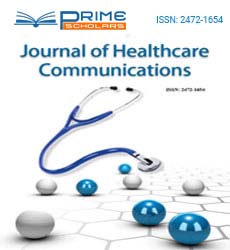Commentary - (2022) Volume 7, Issue 4
Use of Electric Painting by Caretakers for Persons with Dementia
Mark Steven*
Department of Medical Faculty, University of Adelaide, Australia
*Correspondence:
Mark Steven, Department of Medical Faculty, University of Adelaide,
Australia,
Tel: +618985705473,
Email:
Received: 30-Mar-2022, Manuscript No. IPJHCC-22-13384;
Editor assigned: 01-Apr-2022, Pre QC No. IPJHCC-22-13384(PQ);
Reviewed: 15-Apr-2022, QC No. IPJHCC-22-13384;
Revised: 20-Apr-2022, Manuscript No. IPJHCC-22-13384(R);
Published:
27-Apr-2022, DOI: 10.35248/2472-1654-7.4.7018
Description
Painting is a well-known technique for reducing stress, but it’s
unclear whether family parents can use an electronic canvas
stage at home for this purpose. The goal of this study was to
assess the feasibility and efficacy of having family caregivers
of people with dementia (FCPWD) create electronic works of
art using a mobile application, as well as to assess the overall
impact of the intervention on their well-being. Techniques. The
achievability and worthiness study was conducted in two stages,
with subjective meetings in Phase 1 and subjective meetings
and a quantitative overview in Phase 2.
When the mediation was conducted, the difficulty of providing
care, burdensome side effects, self-assessed wellbeing,
and social assistance were all estimated. Members were encouraged
to draw electronic artistic creations whenever they
pleased and to share them with friends or family members if
they so desired. Result. Phase 2 had an 87.5 percent (28 out of
32) enrollment rate, with 78.6 percent (22 out of 28) members
completing all movements in under two months. The FCPWD
saw the e-painting app as a suitable medium for expressing
their emotions. They liked the application’s format, which they
thought was simple to use.
A total of 116 photographs were sent. The offering of artistic
creations to companions or family members was fundamentally
correlated with sign in recurrence (r = 0.72, p 0.001). Finally,
the FCPWD deemed the e-painting mobile app to be a feasible
and satisfactory innovation-based psychosocial stage. A larger
example in a full-scale randomised controlled preliminary is
justified for further investigation.
Dementia has an impact on both those who suffer from it and
those who care for them. It is estimated that by 2050, the
number of people living with dementia will have increased to
around 152 million worldwide. Without a doubt, family caregivers
for people with dementia (FCPWD) will continue to face
challenges in completing their caregiving responsibilities.
The FCPWD’s inclusion in this study was supported by four non-legislative organisations, and the sample size was small.
This mirrored the challenges of recruiting family guardians for
a research study. Because this intervention was computerised,
some parents were unsure whether or not to participate in the
study due to perceived limitations in advanced education, advanced
abilities, and the ownership of individual cell phones.
This implies that assistance to parents is required, such as the
establishment of a socially and emotionally supportive network
and appropriate training in computerised capability and
advanced framework when advanced intercessions are used to
assist guardians.
This study demonstrates the utility and acceptability of an
e-painting application among dementia caregivers. Despite the
fact that there were no significant changes in their bothersome
side effects, self-evaluated wellbeing, or perceived social assistance,
the parental figures expressed their satisfaction and
delight in using this e-painting application, believing it to be a
channel to communicate their feelings and interact with other
guardians. This 8-week intercession piqued the interest of
parents who were interested in incorporating innovation into
self-care.
This study demonstrated a novel psychosocial support device
for family members of dementia patients that combines computerised
innovation, artwork, and music. More evidence is
needed to determine whether or not this application is effective
in improving the psychosocial well-being of parental figures.
Before a larger scope preliminary is carried out, the findings
of this study recommend potential changes in accordance
with consider to make the application more easy to use.
Acknowledgement
None.
Conflict of Interest
The author declares there is no conflict of interest in publishing
this article has been read and approved by all named authors.
Citation: Mark S (2022). Use of Electric Painting by Caretakers for Persons with Dementia. J Healthc Commun. 7:7018.
Copyright: © Mark S. This is an open-access article distributed under the terms of the Creative Commons Attribution License,
which permits unrestricted use, distribution, and reproduction in any medium, provided the original author and source are
credited.

